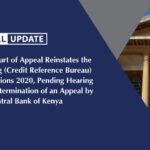A contract of guarantee is an undertaking to perform the promise or discharge the liability of a third person in case of his default. The person who gives the guarantee is called the “surety”, the person in respect of whose default the guarantee is given is called the “Principal-debtor” and the person to whom the guarantee is given is called the “creditor”. In the case of Mwaniki Wa Ndegwa –Vs- National Bank of Kenya Limited & Another HCCC No. 86 of 2000 a guarantee was defined as an undertaking by one or more persons to another person or persons to be liable and make good the liability or obligation of another person or persons.
The consideration usually is in the form of some benefit accruing principal-debtor whose liability is being guaranteed. This is a covenant which attaches to the person natural or juridical who gives the undertaking or guarantee.A guarantee obligation is secondary and accessory to the obligation the performance of which is guaranteed; the guarantor undertakes that the principal debtor will perform his (the principal debtor’s) obligation to the creditor and that he (the guarantor) will be liable to the creditor if the principal debtor does not perform. Therefore, the guarantor’s liability for the non-performance of the principal debtor’s obligation is co-extensive with that of the principal debtor’s. If the principal debtor’s obligation turns out not to exist, or is void, diminished or discharged, so the guarantor’s obligation.
In a banking context, it is an undertaking given by the guarantor to the banker accepting responsibility for the debt of the principal debtor should there be a default. There are many types of guarantees such as: personal guarantees, corporate guarantees, limited guarantees, unlimited guarantees, continuous guarantees and so on.
The following are the essentials of a contract of guarantee: –
- There must be an existing debt which should be recoverable.
- Existence of three parties i.e. Principal debtor, creditor and surety.
- There must be a distinct promise, oral or written, by the surety to pay the debt in case of default committed by the principal debtor.
- The principal debtor must be primarily liable. The surety’s liability is secondary, i.e. the surety’s liability only arises in case of default of the principal debtor.
- There should be some consideration.
- The liability must be legally enforceable.
- The contract of guarantee must have all the essentials of a contract. A contract of guarantee like any other contract, for its validity requires: i) an agreement, ii) between the parties to create a legal relationship, iii) having the capacity to contract iv) supported by consideration express or implied and free from vitiating factors.
With the expansion in the field of the banking and there being an enormous growth in finance, the importance of guarantees cannot be understated.
For more on this get in touch with our following experts through our Contact us Form












